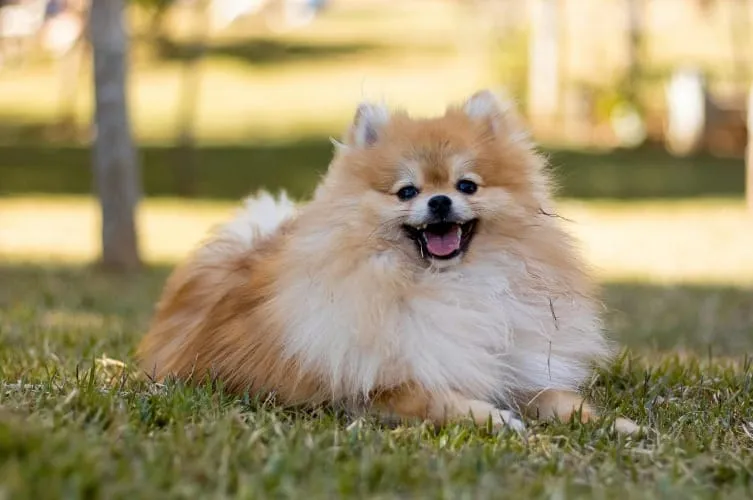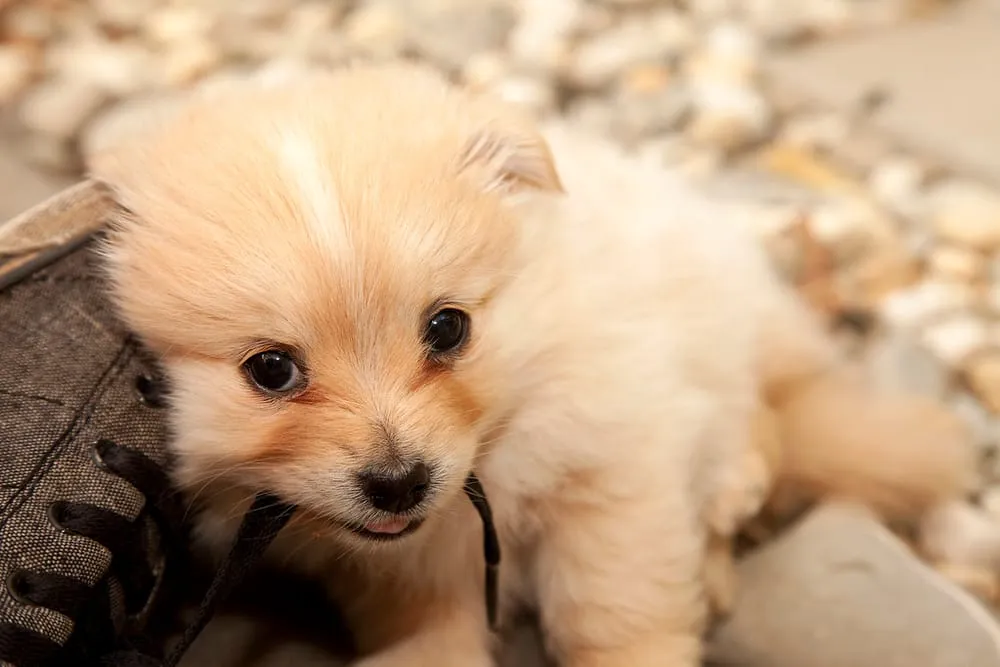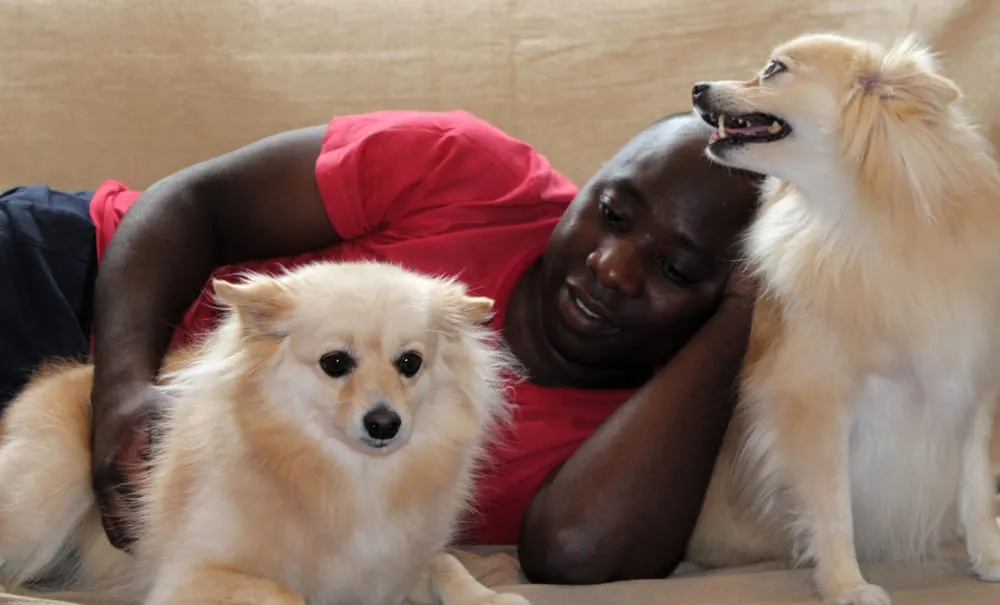Pomeranians are a popular breed of toy dogs known for their fluffy coat and lively personality. They are a favorite among dog lovers due to their adorable looks and charming personality. However, when it comes to training, many people wonder if Pomeranians are easy to train or not.

Training a Pomeranian can be a challenging task, but it is not impossible. Pomeranians are intelligent dogs that can learn quickly if trained properly. However, their stubborn nature can make the training process difficult. It is essential to start training Pomeranians from a young age to ensure that they learn good behavior and obedience.
In this article, we will explore the question of whether Pomeranians are easy to train or not. We will look at the breed's characteristics and temperament to understand how they respond to different training methods. We will also provide tips on how to train a Pomeranian effectively and the common mistakes to avoid. Whether you are a first-time dog owner or an experienced trainer, this article will provide you with valuable insights into training a Pomeranian.
Understanding Pomeranian Temperament
Pomeranians are known for their lively and playful temperament, but are they easy to train? Understanding the temperament of a Pomeranian is crucial in determining their trainability.
Intelligence and Independence
Pomeranians are intelligent dogs that can learn quickly. However, their independence can sometimes make training a challenge. They are known to have a mind of their own and may not always be eager to please their owners. This can make them stubborn at times, but with the right approach, they can be trained effectively.
Attention Span and Trainability
Pomeranians have a relatively short attention span, which can make training sessions challenging. It is important to keep training sessions short and engaging to keep them interested and focused. Positive reinforcement techniques such as treats and praise can be effective in training Pomeranians. Consistency and patience are also essential in training these dogs.
In conclusion, Pomeranians are intelligent and independent dogs with a short attention span. While they may present some challenges in training, with the right approach and techniques, they can be trained effectively.
Fundamentals of Pomeranian Training

Importance of Consistency
Consistency is key when it comes to training Pomeranians. These dogs thrive on routine and predictability, so it's important to establish a consistent training schedule and stick to it. This means training at the same time each day and using the same commands and rewards consistently.
It's also important to be consistent with your expectations. Pomeranians are smart dogs, but they can easily become confused if they receive mixed messages. If you're trying to teach your Pomeranian a new behavior, make sure everyone in the household is on the same page and using the same commands and rewards.
Employing Patience and Positive Reinforcement
Pomeranians respond best to positive reinforcement training methods. This means rewarding good behavior with treats, praise, and affection. Punishment and harsh training methods should be avoided, as they can damage the bond between you and your dog.
It's important to be patient when training your Pomeranian. These dogs can be stubborn at times, and it may take longer for them to learn certain behaviors. However, with patience and consistency, you can help your Pomeranian become a well-behaved and obedient companion.
Incorporating training into your Pomeranian's daily routine is also important. Short training sessions throughout the day can help reinforce good behavior and keep your dog mentally stimulated.
By following these fundamentals of Pomeranian training, you can establish a strong bond with your dog and help them become a well-behaved and obedient companion.

Basic Obedience Training
Pomeranians are generally easy to train, but it is important to start with basic obedience training to ensure that your pup understands the rules and expectations. This will help to establish a good foundation for more advanced training later on.
Mastering Basic Commands
The first step in basic obedience training is teaching your Pomeranian basic commands. These include commands such as "sit, "stay," come," and "heel." Consistency is key when teaching these commands, and it is important to use positive reinforcement techniques such as treats and praise to encourage good behavior.
When teaching your Pomeranian these commands, start with one command at a time and work on it until your pup has mastered it before moving on to the next one. Keep training sessions short, around 10-15 minutes, and try to make them fun and engaging for your pup.
Crate Training Essentials
Crate training is an important aspect of obedience training for Pomeranians. Not only does it provide a safe and secure place for your pup to rest, but it can also help with potty training and preventing destructive behavior.
When crate training your Pomeranian, it is important to choose the right size crate. The crate should be big enough for your pup to stand up, turn around, and lie down comfortably, but not so big that your pup has room to use one corner as a bathroom.
Start by introducing your pup to the crate slowly, using positive reinforcement techniques such as treats and praise to encourage your pup to enter the crate. Gradually increase the amount of time your pup spends in the crate, and always make sure to provide plenty of toys and treats to keep your pup entertained.
Overall, basic obedience training is an essential part of raising a well-behaved Pomeranian. By starting with basic commands and crate training, you can establish a good foundation for more advanced training later on.

House Training Your Pomeranian
When it comes to training your Pomeranian, house training is one of the most important things you will need to do. Here are some tips to make the process easier.
Potty Training Strategies
Potty training your Pomeranian requires patience and consistency. Here are some strategies to help make the process easier:
- Establish a routine: Take your Pomeranian outside at the same time every day, such as after meals or when waking up. This will help them understand when it's time to go potty.
- Use positive reinforcement: When your Pomeranian goes potty outside, give them praise and a treat. This will help them associate going potty outside with good things.
- Supervise your Pomeranian: Keep an eye on your Pomeranian when they're inside to prevent accidents. If you can't watch them, put them in a crate or confined area.
- Be patient: Potty training can take time, so don't get frustrated if your Pomeranian has accidents. Keep up with the routine and positive reinforcement, and they will eventually get the hang of it.
Preventing Behavior Problems
House training your Pomeranian can also help prevent behavior problems. Here are some tips to keep in mind:
- Don't punish your Pomeranian: Punishing your Pomeranian for accidents can actually make the problem worse. Instead, focus on positive reinforcement when they go potty outside.
- Use a crate: A crate can be a useful tool for house training and preventing behavior problems. It can also give your Pomeranian a safe space to relax.
- Watch for signs of anxiety: Some Pomeranians may have anxiety or fear related to potty training. Watch for signs such as pacing or whining, and talk to your vet if you're concerned.
- Be consistent: Consistency is key when it comes to house training and preventing behavior problems. Stick to a routine and use positive reinforcement, and your Pomeranian will be on their way to good behavior.

Socialization and Exercise
Socializing Your Pomeranian
Socializing your Pomeranian is crucial in ensuring that they grow up to be well-behaved and confident dogs. Pomeranians are known to be social dogs and enjoy the company of their owners and other dogs. It is recommended that you start socializing your Pomeranian as early as possible, ideally when they are still puppies.
During the socialization process, expose your Pomeranian to different environments, people, and dogs. This will help them become comfortable and confident in various situations. Introduce them to new sounds, smells, and textures, and praise them when they handle these situations well.
Exercise Requirements
Pomeranians may be small in size, but they require regular exercise to stay healthy and happy. Daily walks, playtime, and interactive toys are all great ways to keep your Pomeranian active.
It's important to note that Pomeranians have a tendency to gain weight if they don't get enough exercise. Obesity can lead to health problems such as joint pain and diabetes. Therefore, it's essential to ensure that your Pomeranian gets enough exercise to maintain a healthy weight.
In addition to physical exercise, mental stimulation is also important for Pomeranians. Interactive toys, puzzle games, and training sessions can help keep their minds active and prevent boredom.
Overall, socialization and exercise are crucial for the well-being of your Pomeranian. By providing them with ample opportunities to socialize and exercise, you can help ensure that they live a happy and healthy life.
Advanced Training Techniques
Leash Training and Barking Control
Pomeranians can be stubborn creatures when it comes to leash training, but with patience and persistence, it can be achieved. Start by introducing the leash gradually and allow your Pomeranian to become comfortable with it. Once they are used to the leash, begin walking them around your home or yard, rewarding them with treats for good behavior.
Barking is another issue that many Pomeranian owners face. It is important to address barking early on to prevent it from becoming a habit. One effective method is to distract your Pomeranian with a toy or treat when they begin to bark, and then reward them when they stop barking. Consistency is key in both leash training and barking control.
Training with a Trainer Voice
Using a firm and authoritative voice can be effective when training a Pomeranian. This is commonly referred to as a " trainer voice." When using this technique, it is important to remain calm and avoid yelling or physical punishment. Pomeranians respond well to positive reinforcement, so be sure to reward good behavior with treats and praise.
In conclusion, advanced training techniques such as leash training, barking control, and using a trainer voice can be effective in training a Pomeranian. With patience, consistency, and positive reinforcement, your Pomeranian can become a well-behaved and obedient companion.

Challenges in Training Pomeranians
Pomeranians are known for their intelligence and quick learning abilities, but they can also be challenging to train. In this section, we will discuss some of the common challenges that owners face when training their Pomeranians.
Dealing with Stubbornness
One of the biggest challenges in training Pomeranians is dealing with their stubborn nature. Pomeranians are known for having a strong-willed personality, and they can be quite stubborn when it comes to training. This can make it difficult for owners to get their Pomeranians to obey commands and follow through with training.
To overcome this challenge, owners should use positive reinforcement techniques when training their Pomeranians. This means rewarding good behavior with treats, praise, and affection. Consistency and patience are also key when training a Pomeranian, as it may take some time for them to fully understand what is expected of them.
Overcoming Distractions
Another challenge in training Pomeranians is overcoming distractions. Pomeranians are easily distracted by their surroundings, which can make it difficult to keep their attention focused on training. This can be especially challenging when training a Pomeranian puppy, as they may be more interested in exploring their new surroundings than in learning new commands.
To overcome this challenge, owners should start training their Pomeranians in a quiet and distraction-free environment. As their training progresses, owners can gradually introduce more distractions to help their Pomeranians learn to focus on their commands. Using treats and positive reinforcement can also help keep a Pomeranian's attention focused on training.
In conclusion, while Pomeranians are generally smart and quick learners, they can be challenging to train due to their stubborn nature and tendency to become easily distracted. By using positive reinforcement techniques, consistency, and patience, owners can successfully train their Pomeranians and help them become well-behaved and obedient companions.
Conclusion
In summary, while Pomeranians are indeed intelligent and capable learners, their training requires a nuanced approach due to their unique temperament. The key to successfully training a Pomeranian lies in understanding their lively and independent nature. Employing consistent, patient, and positive reinforcement techniques will yield the best results. Starting training early, focusing on socialization, and addressing challenges like stubbornness and distractibility with understanding and persistence are crucial.
Remember, each Pomeranian is an individual with their own personality and learning style, so be adaptable in your training methods. With the right approach, you can harness their intelligence and spirited nature to develop a well-behaved, obedient, and happy canine companion. Ultimately, training a Pomeranian not only enhances their behavior but also strengthens the bond between you and your beloved pet.
FAQs
- Are Pomeranians Easy to Train?
- Pomeranians are intelligent and can learn quickly, but their independent nature can make training a challenge. With consistent, positive reinforcement, they can be trained effectively.
- What is the Best Age to Start Training a Pomeranian?
- The best time to start training a Pomeranian is as early as possible, ideally when they are puppies. This helps inculcate good behavior and obedience from a young age.
- How Long Should Training Sessions Be for Pomeranians?
- Due to their short attention spans, training sessions for Pomeranians should be short and engaging, typically around 10-15 minutes, to keep them focused and interested.
- What Are Some Effective Training Techniques for Pomeranians?
- Positive reinforcement techniques such as treats, praise, and affection are effective for Pomeranians. Consistency in commands and expectations is also crucial.
- Can Pomeranians Be Crate Trained?
- Yes, Pomeranians can be crate trained. It's important to introduce them to the crate gradually and use it as a positive space, not for punishment.
- How Do You Deal with a Stubborn Pomeranian During Training?
- For a stubborn Pomeranian, patience is key. Consistent reinforcement of commands and rewards for compliance, along with a firm yet gentle approach, can help overcome stubbornness.
- Are Pomeranians Prone to Behavioral Problems?
- Pomeranians can develop behavioral problems if not trained properly. Issues like excessive barking or stubbornness can arise, but with proper training and socialization, these can be managed effectively.




